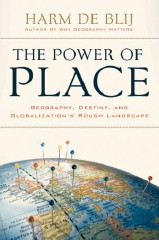Review: The Power of Place
The Power of Place: Geography, Destiny, and Globalization’s Rough Landscape
by Harm de Blij
Oxford University Press, 2008. Hardcover, 294 pp. ISBN 978-0-19-536770-6
 “The future is already here. It’s just not very evenly distributed,” the science-fiction writer William Gibson has said. Legendary geographer Harm de Blij’s latest book, The Power of Place: Geography, Destiny, and Globalization’s Rough Landscape is a pointed rebuttal to those who think that globalization has rendered the world flat, a global village around which its inhabitants can move freely. Modernity (as Eugen Weber argued in his study of 19th-century France, Peasants into Frenchmen) is not evenly distributed. De Blij makes a convincing case that, rather than flat, the world is quite rough around the edges. He splits the world into a developed core — the European Union, Israel, the U.S. and Canada, Australia and New Zealand, Japan, Taiwan and South Korea — and a rough periphery. Only a small fraction of the world’s population — less than three percent — live in a country other than that of their birth. Apart from the highly mobile globals, and the mobals making the difficult trek from local communities to the sweatshops and conurbations that serve as points of contact to the flat world, the rest are trapped, by reasons of geography — economics, religion, health, the status of women — in their localities. Geography matters, De Blij argues — and not for the first time.
“The future is already here. It’s just not very evenly distributed,” the science-fiction writer William Gibson has said. Legendary geographer Harm de Blij’s latest book, The Power of Place: Geography, Destiny, and Globalization’s Rough Landscape is a pointed rebuttal to those who think that globalization has rendered the world flat, a global village around which its inhabitants can move freely. Modernity (as Eugen Weber argued in his study of 19th-century France, Peasants into Frenchmen) is not evenly distributed. De Blij makes a convincing case that, rather than flat, the world is quite rough around the edges. He splits the world into a developed core — the European Union, Israel, the U.S. and Canada, Australia and New Zealand, Japan, Taiwan and South Korea — and a rough periphery. Only a small fraction of the world’s population — less than three percent — live in a country other than that of their birth. Apart from the highly mobile globals, and the mobals making the difficult trek from local communities to the sweatshops and conurbations that serve as points of contact to the flat world, the rest are trapped, by reasons of geography — economics, religion, health, the status of women — in their localities. Geography matters, De Blij argues — and not for the first time.
The book is illustrated by two-colour maps throughout. I found a few quibbles in the text and maps about Canada that I knew to be wrong: women’s suffrage arrived in my country before 1960 (pp. 178-179), and we’ve had a female leader (p. 172), for example. And there are typos and glitches here and there. But I’m not the sort who thinks that nitpicky errors can shoot down a book’s overall argument, which in this case is very strong and thought-provoking. It’s given me some food for thought in terms of helping me understand the relationship between my little village: an hour outside Ottawa, but isolated in so many ways that you’d think it was in another era and place, not a (long) commute from the nation’s capital.
This was the first book by de Blij that I’ve read, and it was a pleasure. I’m sure that many of you reading this already knew that.
Previously: Harm de Blij Interview; The Power of Place.
- Buy The Power of Place at Amazon.com

Comments
blog comments powered by Disqus